Table of Contents
Security of the home should come first to the minds of every homeowner. Besides the security system and the cameras, an alert and loyal guard dog would increase one’s safety beyond measure. While guarding dogs will certainly protect you physically, they will also psychologically keep intruders away. An ideal guard dog must be intelligent, loyal, alert, and have protective instincts while still being a loving family member.
In this blog post, we talk about the five best home-guarding dogs, their temperament, training needs, pros, cons, and what sets them apart as the best.
Top 5 Best Guard Dogs for Home Protection are:
1. German Shepherd
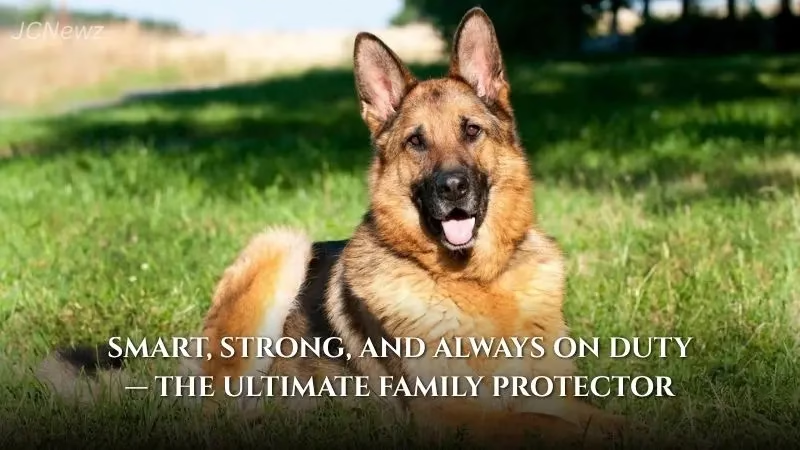
Overview:
German Shepherds are one of the most intelligent dog breeds known around the world. They are known for their intelligence and loyalty. The German Shepherd is originally from Germany and was bred to herd and protect sheep. This is why the German Shepherd has the instinct to protect and obey commands.
Key Traits:
- Height: 22–26 inches
- Weight: 22.7kg- 40kg
- Lifespan: 9–13 years
- Temperament: Intelligent, confident, loyal, courageous
Why They’re Great Guard Dogs:
- Extremely smart and trainable: German Shepherds are known for their intelligence and trainability. These dogs are naturally very smart and protective of their owner and their homes.
- Protective towards family and territory: These dogs are naturally very protective towards their loved ones and family members. This makes them an excellent guard dog for the family.
- Adapts in any environment: They are known for their adaptability and can live easily in any climate.
- Physically strong to detain intruders: German Shepherd dogs are naturally very strong, which helps them defend against any intruders.
Training & Socialization:
German Shepherds require proper training and socialization from an early age. They are highly trainable and need regular mental stimulation and work. If they are not trained properly or given proper exercise, they can develop behavioral issues.
Pros:
- Get along with children: These dogs get along with kids easily and can be pretty protective over them.
- Excellent in protection work: German Shepherds are mostly used by the military and police for protection work, and they have always proven to be excellent in protection work.
- Loyal companion: They are very protective and loyal towards their owners and family members.
Cons:
- Energetic: The dog needs exercise and mental stimulation almost every day. Walks, playtimes, and training-they all constitute happy times for this creature.
- Protective Instincts: With minimal early socialization, they will harbor the tendency to become too protective or wary of strangers. Constant exposure to different people, scenarios, and environments is a must.
- Shedding: Throughout the year, the dog will shed. Brushing keeps loose hair to a minimum and ensures a healthy coat.
2. Rottweiler
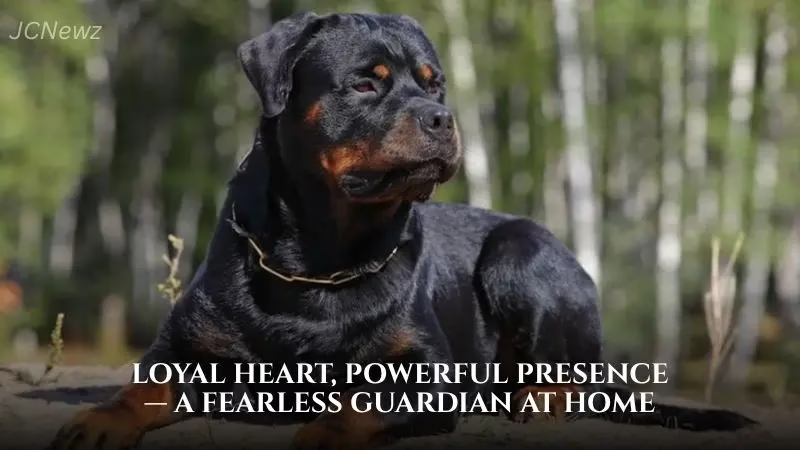
Overview:
Rottweilers are large, powerful, muscular dogs with a strong guarding instinct and courage. Originally bred for herding livestock and cart pulling, these dogs are admired for their loyalty and capability to serve as protectors.
Key Traits:
- Height: 22–27 inches
- Weight: 36- 60kg
- Lifespan: 8–10 years
- Temperament: Protective, obedient, alert, confident
Why They’re Great Guard Dogs:
- Naturally alert: Rottweilers are naturally wary of strangers and do not trust unknown people easily.
- Very loyal towards family members: Rottweilers are very loyal towards their family members and their loved ones.
- Intimidating appearance and strength: These dogs are muscular build and look dangerous. This comes as an advantage to scare off intruders or even fight if needed.
- Highly trainable: They are highly trainable and take commands well.
Training & Socialization:
Rottweilers need to be trained firmly and in obedience from a young age. They need an owner who is firm and can establish themselves as a strong and confident leader.
Pros:
- Instinct to guard personal property and owners: They have an instinct to guard their property and owners from a young age.
- Extremely intelligent: They are very intelligent and take obedience commands well.
- Family oriented: They are affectionate towards their family and are friendly with kids if trained well.
Cons:
- Not for first-time dog owners: Rottweilers can be a good family dog, but not ideal for someone who has no prior experience in owning a dog.
- Requires a strong and confident leader: Dogs like to be under control and follow commands. If the owner fails to project himself as a strong leader, the dog may not follow his lead and make wrong decisions in life.
- Can become aggressive if not trained well: If not trained properly, these dogs may become aggressive over time.
3. Doberman Pinscher
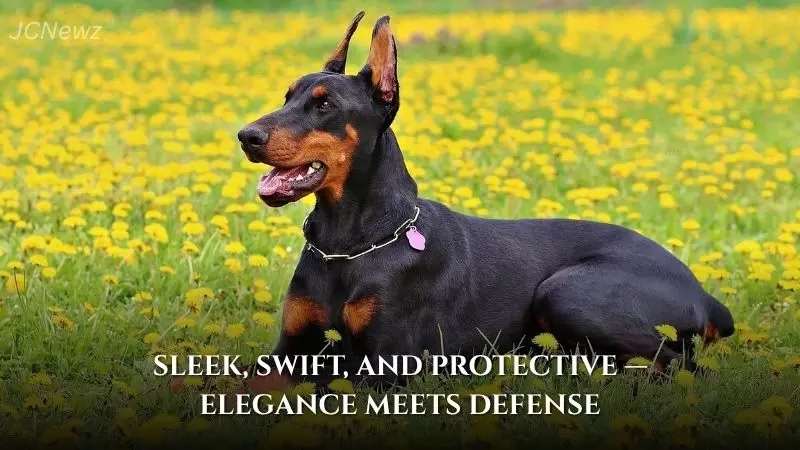
Overview:
Bred in the 19th century by a German tax collector, Doberman Pinschers are known for their sleek appearance and loyalty. These dogs were bred for personal protection, which makes them an excellent guard dog.
Key Traits:
- Height: 24–28 inches
- Weight: 27- 40kg
- Lifespan: 10–12 years
- Temperament: Loyal, energetic, alert, fearless
Why They Are Great Guard Dogs:
- Protective and loyal: Doberman was bred for the sole purpose of guarding and protecting their owners; their instinct is to guard and protect their owners.
- Power with explosiveness: These dogs are fast, strong, and extremely agile. They respond fast to commands and can do extremely well in personal protection work.
- Trainability and intelligence: They are very smart and highly trainable and can take commands easily.
- instinct to protect property and owners: Dobermans are known for their instinct to be protective of their owners and property.
Training & Socialization:
Dobermans are highly energetic dog breeds and need regular exercise and proper training from a young age. If not properly socialized, the dog may react to any guest or visitor due to their natural suspicious characteristic.
Pros:
- Athletic and sleek appearance: These dogs are very athletic and have a muscular frame, which makes them look intimidating.
- Loyal family dog: Dobermans are known for their loyalty and are often clingy towards their owner. If trained properly, they can be as good a family dog.
- Low maintenance: Dobermans don’t need much grooming as they have short coats. This makes it easy to groom these dogs, and owners don’t have to spend a lot on their grooming.
Cons:
- Regular mental stimulation and exercise: Dobermans are a highly energetic breed and need regular exercise and mental stimulation exercises every day. If not done properly, they can easily get bored and can easily get bored and develop destructive behavior.
- May become reactive if not trained properly: Just like any other dog, if the Doberman is not trained properly, the dog may become reactive and aggressive over time. Hence, proper training for its owner and the dog is compulsory.
- Not open with strangers: Dobermans usually stay reserved with strangers and don’t open up easily. They take time to trust new members in the family or guests.
4. Bullmastiff
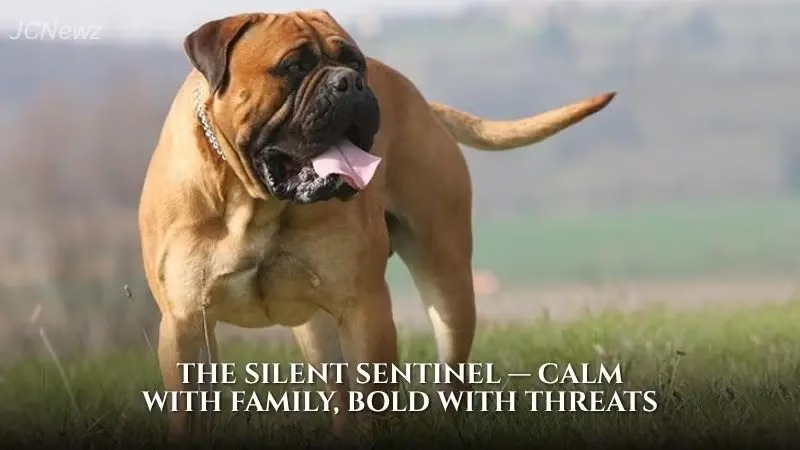
Overview:
Bullmastiffs are a large, muscular dog breed that originated in England as a guard dog to protect properties. These dogs are extremely friendly and loyal towards their family, but can be very protective if necessary.
Key Traits:
- Height: 24–27 inches
- Weight: 45 – 58kg
- Lifespan: 7–9 years
- Temperament: Calm, fearless, devoted, protective
Why They’re Great Guard Dogs:
- These dogs are naturally protective: These dogs are naturally protective of their owner and property.
- Don’t bark unnecessarily: These dogs are generally quiet and don’t bark unnecessarily.
Training & Socialization:
Bullmastiffs need early socialization to distinguish between a real threat and a friendly visitor. They’re intelligent and quick learners, but can be stubborn at times.
Pros:
- Good for small houses and apartments: Despite their huge size, these dogs lack stamina and energy, hence it is easy to keep them in small apartments and houses.
- The silent guardian: These dogs don’t bark often, and are often silent and observant
- Good with children: These dogs are very gentle and are good with children.
Cons:
- Shorter life span: These dogs have a shorter lifespan than most dogs.
- Health issue: These dogs are prone to health complications like hip dysplasia.
- Sometimes stubborn: Bullmastiffs can act lazy and stubborn during training.
5. Belgian Malinois
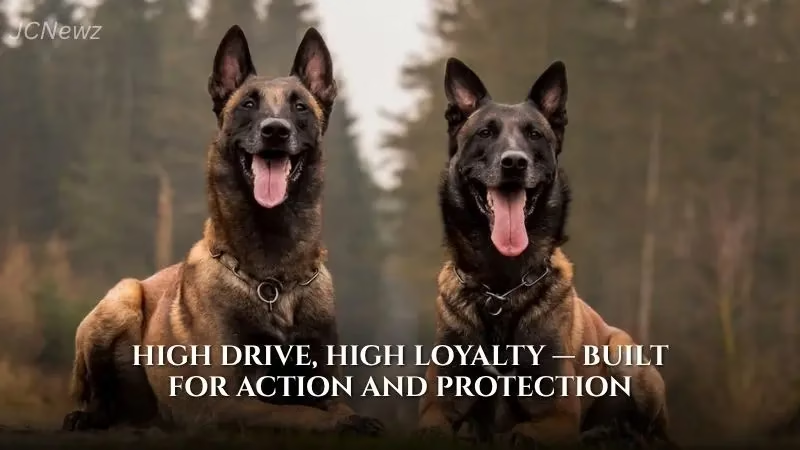
Overview:
Frequently used in police and military work, Belgian Malinois are alert, high-energy dogs that excel in guarding and protection. Their intelligence and obedience make them a favorite among security professionals and active homeowners.
The Belgian Malinois, often referred to as “maligator,” is mostly used by law enforcement and military work. These dogs are extremely energetic, work motivated, smart, intelligent, and agile. These dogs are widely used all over the world for protection work.
Key Traits:
- Height: 22–26 inches
- Weight: 18- 36kg
- Lifespan: 12–14 years
- Temperament: Alert, energetic, intelligent, confident
Why They’re Great Guard Dogs:
- Extremely agile and fast: These dogs are known for their explosiveness, power, and motivation to work. They can work under any pressure in the environment and are very fast and agile in terminating or restraining threats.
- Highly work motivated: Malinois are not like any other dogs; they are highly work motivated and thrive on strict discipline and work.
- Fierce companion: These dogs know no fear. They will go one-on-one with the intruder and fight till their last breath.
Training & Socialization:
Malinois are extremely energetic dog breeds and are very intense. They need regular training and high endurance exercise to keep them calm.
Pros:
- Loyal towards owner: Malinois are very loyal towards their family and can take on anyone to protect them.
- Excel in protection work: These dogs are mostly bred for protection work, and they are excellent in military and protection work.
Cons:
- Not a regular pet dog: These dogs thrive on high endurance exercise and protection work and are not suitable for families who are not physically active.
- Need work to be happy: Malinois need regular work to keep them happy. If they are not exercised and trained properly, they can turn aggressive towards humans.
- Too intense for family: They are highly work-motivated dogs and need experienced handlers to handle them. These breeds may not be ideal for most houses.
Final Thoughts
When choosing a guard dog, it is important to keep in mind that regardless of which breed you choose, you have to be mentally prepared to train them from a young age, spend quality time with the dog always, and exercise them daily. Along with breed selection, you also have to keep in mind the bloodline they come from.
If you are looking for a protection dog, you must choose the dog from a working dog bloodline, which means the dog’s parents and everyone in its bloodline have done protection work. Apart from that, choosing a dog won’t help fully. You need to train the dog as a “ Personal Protection Dog” to train them to protect you and your family when threatened by any danger.
In conclusion, selecting the right guard dog for home protection is a significant decision that requires careful consideration. These animals are not mere accessories or status symbols; they are loyal companions that demand commitment, care, and understanding. Before bringing a dog into your home, take the time to thoroughly research the necessary details, including the pros and cons of each breed. This ensures you choose a canine that fits your lifestyle and can effectively fulfill its role as a protector.
We encourage you to share this blog post on social media to help others make informed decisions about welcoming a guard dog into their lives.

